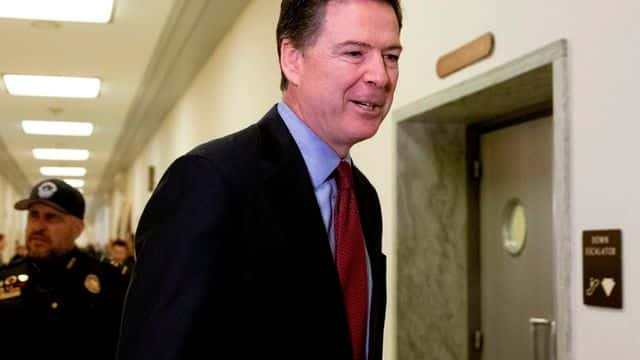A report released on Wednesday revealed that two of President Donald Trump’s opponents had been chosen for a rare audit, prompting additional inquiries for the commissioner of the Internal Revenue Service.
Charles Rettig came under new scrutiny after the New York Times reported that both former FBI director James Comey and his deputy, Andrew McCabe, were the targets of highly unusual audits for which the IRS claims were chosen at random.
Rettig’s appointment by Trump to lead the service in 2018 surprised many tax professionals when it was made public. The audits are true, according to The Washington Post.
When Trump appointed Rettig to lead the organization, which has around 71,000 full-time employees, he was a tax lawyer in Beverly Hills, California.
He had defended individuals accused of hiding money in offshore accounts, including a billionaire, a venture entrepreneur accused of hiding assets through false accounting, and the heirs of a multimillion defence contractor who attempted to avoid paying inheritance taxes.
He began his four-year term in 2018 as a Trump supporter, defending the former president’s tax returns from the public’s scrutiny in the face of a House Democratic lawsuit.
However, Rettig has also proven to be a willing collaborator for the Biden administration, supporting its initiatives to reduce the difference between what taxpayers owe and what they pay and enacting extensive new stimulus measures.
According to two people with knowledge of the situation who spoke on the condition of anonymity to discuss private conversations, the IRS commissioner’s term is set to expire in November, and Biden administration officials had already started interviewing potential replacements before this week’s news.
Another source with knowledge of the situation who spoke on the condition of anonymity for the same reason as the first indicated that Rettig has expressed openness to a second term.
In light of concerns that it targeted Trump’s opponents with audits, Congress requests an IRS investigation.

Karine Jean-Pierre, a spokeswoman for the White House, repeatedly declined to say whether the president has faith in Rettig’s ability to lead when asked about it on Thursday. She told reporters at her press conference:
“He is going to be up in November, so I will leave it there.” In contrast, the White House, according to Jean-Pierre, “does not comment on enforcement actions made by the IRS.”
The revelation of Comey and McCabe’s audits will bring up challenging concerns for the commissioner and his legacy, though.
Rettig has received plaudits from Democratic lawmakers under President Joe Biden’s administration for his outreach and attentiveness to Capitol Hill, but his devotion to Trump has drawn criticism given the IRS’s stated impartiality.
Given that Treasury is in charge of the IRS, the disclosure will also put Steven Mnuchin, the former Trump Treasury Secretary, under additional scrutiny.
According to a statement from Mnuchin’s spokesman to The Post, “with limited exceptions that do not apply,” it is illegal for the secretary of the Treasury to “request, directly or indirectly, any officer or employee of the Internal Revenue Service to conduct or terminate an audit or other investigation of any particular taxpayer concerning the tax liability of such taxpayer.”
In response, Trump stated, “I have no knowledge of this,” and referred to a Justice Department inspector report from 2019 that criticized Comey and McCabe’s prior probe.
The IRS has consistently insisted that there is no political meddling in its auditing procedures.
Comey and McCabe were chosen for the National Research Program, which ordinarily chooses 13,000 individuals and businesses annually from among hundreds of millions of tax returns for the intensive audit program.
Despite being under Rettig’s leadership, McCabe’s audit began several months into the Biden administration. It was mostly about his 2019 tax return.
The Research, Applied Analytics and Statistics Division of the IRS is in charge of the audit program.
According to John Koskinen, who served as IRS commissioner under the Obama administration and at the start of the Trump administration, a group of career employees, including statisticians and data scientists, run a computer program that randomly selects taxpayers across the income spectrum to determine compliance levels with the country’s tax codes.
According to Koskinen, the names selected in that lottery are then sent to the IRS division in charge of audits.
Rettig submitted the matter to the inspector general for review when specifics of the Times’ reporting became public, according to a statement from IRS spokeswoman Jodie Reynolds.
She said that the IRS was forbidden from commenting on specific taxpayer situations and called it “ludicrous and incorrect” to claim that senior IRS officials had somehow singled out certain people for National Research Program audits.
Read more:-
- Editorial: Two ‘random’ Irs Audits Miraculously Choose to Focus on Two Prominent Trump Foes
- IRS Requests That a US Treasury Watchdog Look Into Audits of Former FBI Agents
- As Canon City School District Considers Selling Property, the Future of Four Mile Community Center Is Uncertain
Individual audits and taxpayer cases are handled by career civil officials; Commissioner Rettig is not involved in any of them. In either administration, he has never discussed IRS enforcement or individual taxpayer issues in his capacity as IRS Commissioner with the White House.
From top to bottom, he has been dedicated to administering the IRS in an impartial, fair manner, Reynolds said.
Given that political intervention is punishable by law on the federal level, former IRS employees voiced their surprise that there might have been political interference in the audit program.
Without the assistance of professional personnel, Rettig could not have authorized or carried out the audit, according to Mark Everson, a former commissioner of the service under the George W. Bush administration.


